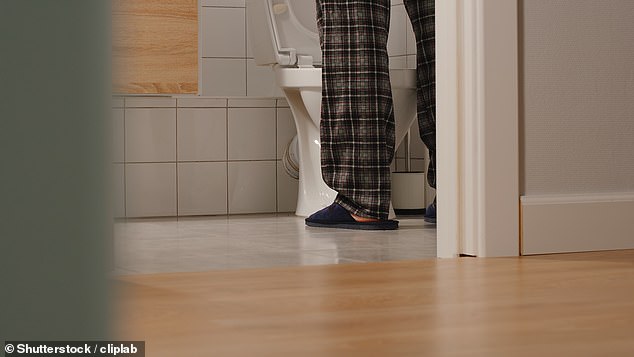Last June, I started to urinate constantly. I was getting up seven times a night, and during the day it was almost as bad. My GP ran tests for diabetes, liver and kidney problems and they all came back clear. My bladder is always aching. I am in utter misery.
Name and address supplied.
What a miserable situation for you. The need to urinate excessively, known medically as polyuria, can be debilitating, as it has been in your case.
In your longer letter, you reveal that you can’t sleep for more than two hours at time as a result. Experiencing constant thirst together with polyuria would suggest type 1 or type 2 diabetes — forms of diabetes which lead to raised blood sugar levels.
The polyuria occurs because the body cannot process the excess glucose (blood sugar) and so it’s expelled in urine. But tests have ruled this out.
This leads me to wonder if it might be diabetes insipidus, which is unrelated to sugar diabetes. It occurs when the pituitary gland, which is behind the bridge of your nose, does not secrete enough anti-diuretic hormone (ADH, also known as vasopressin), which helps ensure the right balance of fluid is maintained in the cells.

Last June, I started to urinate constantly. I was getting up seven times a night, and during the day it was almost as bad. My GP ran tests for diabetes, liver and kidney problems and they all came back clear. My bladder is always aching. I am in utter misery (stock image)
If levels of this hormone are too low, it can result in frequent urination — often at night, when ADH levels should increase. One way to test for this is to stop drinking for three hours and then record how much urine is produced over the next three hours. If ADH levels are low, then the urine output will remain high.
Another way to self-check is to record your fluid input and urine output over 24 hours. Accuracy is key: you must start by emptying your bladder, discarding that sample, and measuring from the moment your bladder is empty. At the end of the 24 hours, include the final sample in the total. Once you have these figures, you should consult your doctor again.
Your GP may then recommend a 24-hour urine collection under specialist supervision to confirm diabetes insipidus.
If this is what you have, you’ll be advised to stick to a diet low in salt and protein. This will help reduce the amount of sodium and nitrogen your body has to excrete, and in turn, your urine output. If the symptoms do not improve, you may be prescribed a drug, desmopressin, which replaces the anti-diuretic hormone.
I’ve just been diagnosed with severe osteoporosis following a bone density scan. On doing some research I found that lansoprazole, which I have been taking for five years for oesophagitis, can cause bones to thin. The doctor has prescribed alendronic acid as well as Adcal tablets, but am I OK to still take lansoprazole?
Ruth Taylor, St Helens, Merseyside.
Plenty of my patients have had questions about these medications, and I am sure many readers will share your concerns, too.
As you know, lansoprazole is taken to relieve heartburn caused by acid reflux. It is a type of medication called a proton pump inhibitor, which works by blocking the stomach lining from releasing hydrochloric acid, or stomach acid.
Proton pump inhibitors can sometimes reduce your ability to absorb calcium, especially when in the form of calcium carbonate. That’s because you need stomach acid to help break down foods — calcium carbonate can’t dissolve in water.
This explains why long-term use of proton pump inhibitors is linked to a raised risk of bone fractures.
You have been prescribed vitamin D and calcium, in the form of Adcal tablets, and alendronic acid, a bisphosphonate drug that works by slowing down the cells that break down bone. These medications are proven to help those with osteoporosis.

I’ve just been diagnosed with severe osteoporosis following a bone density scan. On doing some research I found that lansoprazole, which I have been taking for five years for oesophagitis, can cause bones to thin. The doctor has prescribed alendronic acid as well as Adcal tablets, but am I OK to still take lansoprazole? (stock image)
The challenge is that the calcium you’re taking (calcium carbonate) needs your stomach to be acidic in order to work best. This acid will be affected by lansoprazole.
As a result, your calcium absorption may be lower than is ideal for your bone health.
Research has shown that while calcium from food, such as milk and cheese, is not affected by proton pump inhibitors, some types of calcium supplement can be — calcium citrate is preferred over calcium carbonate, as it does not require stomach acid to be absorbed.
As Adcal is calcium carbonate combined with vitamin D, I’d suggest discussing this with your doctor. You could take vitamin D along with a separate calcium citrate supplement instead, which should resolve your dilemma.
Source link : https://www.dailymail.co.uk/health/article-10058417/Why-sleep-without-needing-urinate-DR-MARTIN-SCURR-answers-health-questions.html











